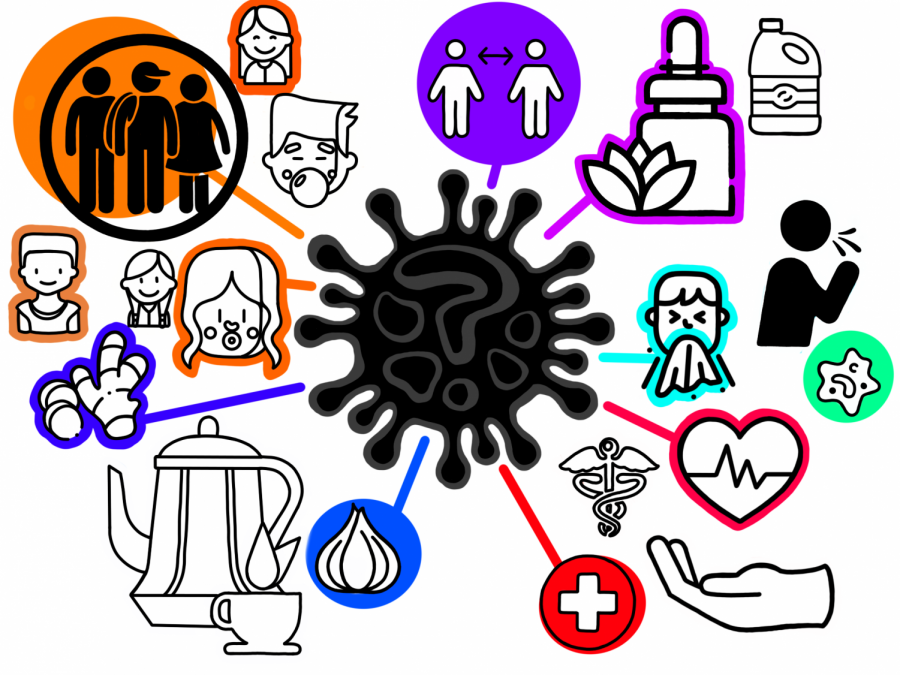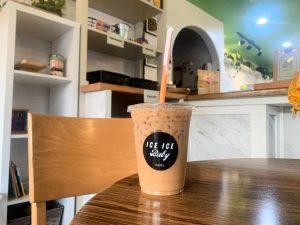Let’s debunk those COVID-19 myths
Many falsehoods have seemingly developed over the duration of COVID-19’s existence, all of which need to be debunked in order to truly understand what this virus is and what you can do to protect yourself and others from it.
November 19, 2020
Although some COVID-19 myths seem far-fetched and unreasonable, some people can still fall prey to these untruthful statements.
Mika Anderson, a biology teacher and director of the Bioscience Academy at Foothill Technology High School (Foothill Tech), stated “COVID myths are driven by political views and are supported by personal bias.” John Weldele, a chemistry and Advanced Placement (AP) physics teacher at Foothill Tech, said that “COVID myths are a problem because they prevent people from following the best advice concerning prevention and treatment.” To guide in your search for factful information about the pandemic, and to avoid digesting fanatical information from the web, here are a few common myths debunked.
Myth 1: Young people can’t get the virus
This is completely FALSE. COVID-19 is a virus that can be contracted by anyone and is spread by people of all ages. “Anyone can have mild to severe symptoms,” wrote the Centers for Disease Control and Prevention (CDC). Individuals with lung disease, diabetes and other health conditions are considered high risk but anyone can develop a bad reaction when met with COVID-19. “Kids are not immune to the novel coronavirus” stated Michigan Health.
“Though no one is invulnerable, we’ve seen that older adults are at increased risk for severe illness or death from COVID-19,” wrote the Harvard Health Publish.
Myth 2: “I’m healthy, so I don’t need to practice social distancing”
This is also FALSE. Things can happen. It’s the time to think about others, more than even before. Even if you feel totally healthy, you can be an asymptomatic carrier of the virus. “If you throw caution to the wind and think you are invincible and that you have nothing to do with being a vector that transmits the virus, this pandemic will keep spreading,” Anderson commented.
Since everyone is able to carry the virus, the people who are less vulnerable can spread the Coronavirus to a family member, friend, grandparent or a member of the community that is at risk.
“People can’t keep thinking that they are the exception to the rule. Science doesn’t take sides,” Anderson stated.
Healthy children, teens and young adults have the potential to effectively recover from COVID-19, but they can still spread it to others who are possibly more vulnerable. Since COVID-19 is negatively compatible with anyone of any age, there are many precautions that need to be taken in order to prevent the spread.
Myth 3: Home remedies can cure or prevent the virus.
This is FALSE. There currently is no cure for the virus. Sadly, your favorite herbal teas are not going to save you from COVID-19 (but you can still drink them for fun). Neither will sniffing or eating ginger and drinking ginger ale. Garlic, though it helps the immune system, has not proven to help you against the virus either.
Right now, there are vaccines being made and tested, however, there is no cure for the Coronavirus yet. One way to avoid getting the virus is by taking precautions. So far, scientists have deemed that the best way to prevent contraction of COVID-19 is staying home (unless you need to leave for the grocery store… etc). “I know it seems overly simple but wash your hands after you return from an outing” is really important, Anderson commented.
Washing your hands can truly help the virus from spreading. You should also social-distance, wear a mask and constantly sanitize your hands and surfaces (if unable to wash). Weldele also mentioned to not “feel overconfident in a mask” and “you should still try to keep your distance from others even when wearing a mask.” A distance of six feet can be beneficial.
Myth 4: COVID-19 is just a bad seasonal flu
This is also incorrect! Although COVID-19 and Influenza(flu) have similar characteristics, they have many important differences. Even though the symptoms are similar to the common flu, the Coronavirus has a higher mortality rate.
Another important difference is that there is a vaccine for the flu. As mentioned previously, there is currently no ready vaccine to prevent COVID-19.
Sometimes it may be hard to tell the difference between both illnesses, and as a result being tested for COVID-19 is one of the only ways to confidently determine which you have. This can also be an issue because people can also be asymptomatic and not all people will get tested. “Get tested after five days of possible exposure (if you go too early, your body won’t develop enough antibodies and you might get a false negative),” Anderson mentioned.
Myth 5: You can protect yourself from COVID-19 by gargling bleach or using essential oils.
Once again, this is FALSE. Gargling bleach or essential oils does not prevent COVID-19 and can be very dangerous for your health. If this does occur, you can be poisoned, injured or even die. There is also no evidence that gargling of any substance can reduce the possibility of infection.
At the beginning of quarantine, many people were misusing disinfectants, bleach and other harmful substances. Sadly, there is nothing to cure the Coronavirus yet, so consuming your handy dandy hand-gel won’t prevent you from getting infected.
There are many ways to avoid believing COVID-19 myths. “It’s important to always consider the source of your information,” Anderson stated. You should always check if it’s a reliable source so you know if what they’re saying is the truth!
“Avoid myths and rumors by educating yourself,” Weldele commented.
Another way is by staying informed. If you see a questionable hypothesis about COVID-19 on the internet, a social media platform or somewhere else, look it up for yourself. Find out if it’s true! “Look at what respected organizations have to say, such as the WHO, CDC or mainstream media sources,” Weldele mentioned. This can then lead to you being less susceptible to false information.
“If everybody will just follow the science and take these precautions (wear masks, wash hands, avoid gatherings, get tested, etc.) we might have this pandemic under control already,” Anderson disclosed. Always remember to follow precautions to avoid the Coronavirus and we can get this virus under control if we all just pitch in.
















Jack Gonzalez • Nov 22, 2020 at 12:46 pm
It is a myth that surgical masks are significantly effective at reducing the transmission of COVID-19. While N95 masks are effective, surgical masks are NOT! People should be wearing N95 masks and should immediately stop wearing surgical masks.
https://www.acpjournals.org/doi/10.7326/M20-6817
“ A total of 3030 participants were randomly assigned to the recommendation to wear masks, and 2994 were assigned to control; 4862 completed the study. Infection with SARS-CoV-2 occurred in 42 participants recommended masks (1.8%) and 53 control participants (2.1%).”